Do you have a child who’s struggling with separation anxiety, especially at when being dropped off at school or early education? Perhaps they’re going through a developmental milestone that makes them need Mum or Dad a bit more than before. This is common starting around six months of age, peaks at 14-18 months, then can happen again when your child hits preschool and school-age. Or maybe your child is new to our service or has recently transitioned studios. The transition from home to early education is a milestone for both children and families. Separation anxiety can even happen for children who’ve been in Little Scholars for a while. It can be hard moving into a new studio where she or he doesn’t yet know new routines, where things are kept and spending time with different educators with different ways of doing things can be overwhelming for the child. This is all normal.
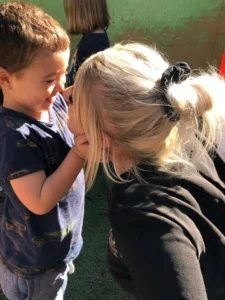
If you’re at a loss on how to make things easier on your little one, and yourself, we have some ideas.
Acknowledge and validate their feelings by saying something like “I know goodbyes can be hard, but I always come back. I will see you later today. I love you.” Give a big hug, a smile and a wink.
Then at home, if your child is old enough, have a chat about why she/he is having a hard time at drop-off, and think about what you can do to alleviate it. Ask him or her what make things easier. Perhaps it’s including a comfort toy, blanket or family photo. Maybe you each have a special bracelet that you can touch when you’re missing each other. Make a plan for something special together when you pick him or her up, like a walk or playing a game together, which will give your child something to look forward to through the day.
If you’re preparing your child to go to early education or school, it’s best they understand what their days will look like. So the conversation could look something like ‘we’ll all have breakfast together and get ready for the day. Then we’ll get in the car and first we’ll stop at Little Scholars. I’ll walk you in, give you a big hug, and you’ll go off to have a day of play while I go to work. When I finish work, I’ll jump in the car and come right over to pick you up, then we’ll go _____” These conversations may have to happen several times for it to sink in.
Also, if you’re pondering signing your child up for early education, this is why we offer play dates to children newly enroled but yet to start – this allows them to begin to become familiar with their new educators and studios.
Remember, you can always chat with your educator or campus manager about how to help. We’re always available, and we’ve been through this before, we can offer ideas or reassurances everyone will be OK!
We also know separation anxiety can be a two-way street, especially for new parents, or returning to work after maternity leave. Don’t forget we have our Little Scholars app so you can see pictures of your child, and be reassured that if there were tears from your child, they likely didn’t last long and they’re busy having fun and learning while you’re at work.
Related links:
For parents leaving their babies or young toddlers in care for the first time, it can be a stressful experience. When the paid maternity leave ends, parents must make the decision of whether or not both parents will work outside the home. The choice to leave their young child in early learning and care can create a number of concerns, one big one being how their relationship with their young child will be affected if the parent is not spending the majority of the child’s time with them. These are valid concerns, but research has suggested infant attachment to their parents is not generally affected by being in care, so long as the parents have a strong bond with the child when they are with them.
Understanding Attachment Theory
Attachment theory was first introduced by John Bowlby, a British psychoanalyst and psychiatrist in the 20th Century. Bowlby observed that early attachments could significantly affect a child’s emotional development and adult relationships in later life. He concluded that children between six and 30 months were very likely to form emotional attachments to familiar caregivers, especially if the adults are sensitive and responsive to child communications. This led him to propose the Attachment Theory after he studied the negative impact of maternal deprivation on young children.
Mary Ainsworth, an American psychologist who worked under Bowlby early in her career, later devised an assessment technique called the Strange Situation Classification (SSC) to investigate how attachments might vary between children. Her research in Uganda, then her well-known Baltimore Study in the 1960s, in which she noticed distinct individual differences in the quality of mother-infant interactions over time, led her to categorise these different attachment styles into three types: secure attachment styles, insecure attachment styles, and not-yet attached. She found a connection between maternal sensitivity and secure attachments. Sensitive mothers were familiar with their babies, provided spontaneous and specific detail about their children, and babies of sensitive mothers cried less and felt free to explore in the presence of their mother. Generally, she concluded that babies of sensitive mothers have secure attachments.
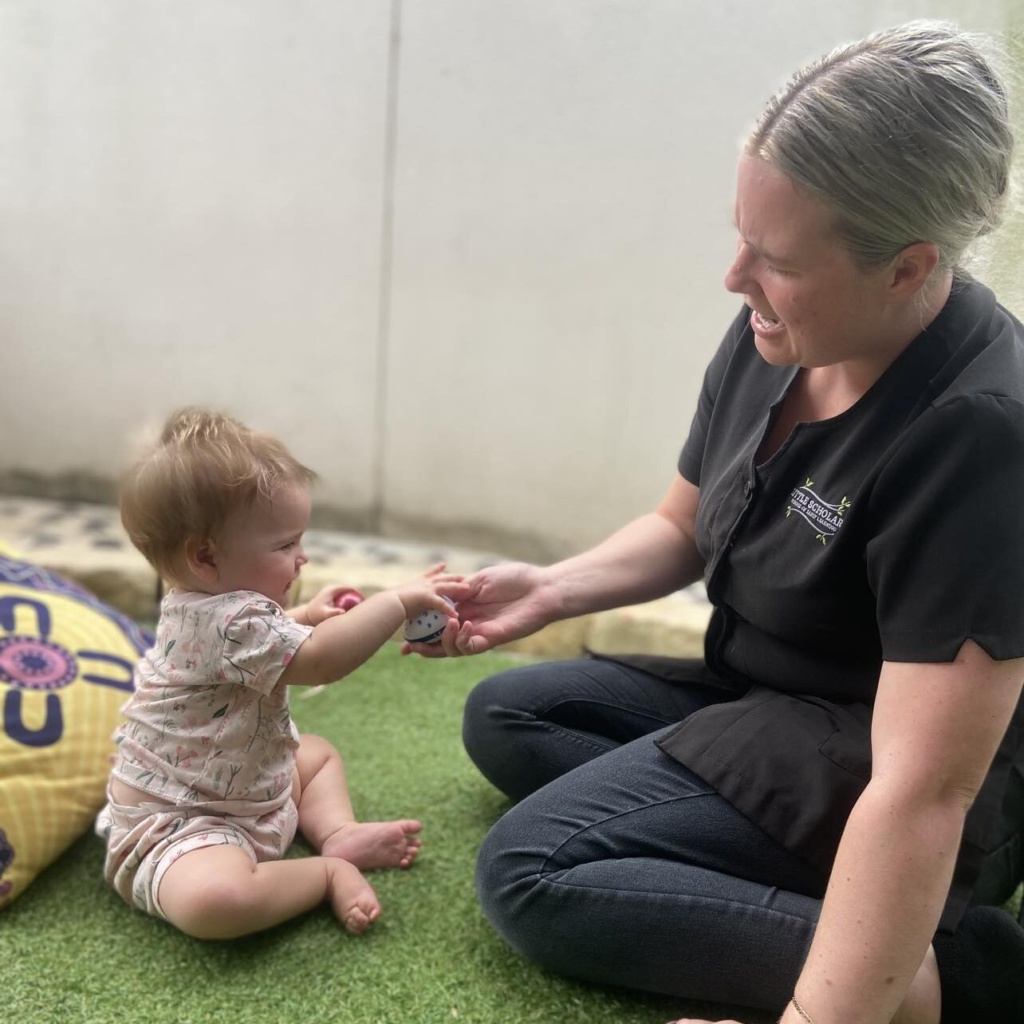
While Bowlby’s initial findings focused on maternal deprivation, later studies have contradicted his emphasis. Schaffer & Emerson (1964) found that specific attachments started at about eight months and shortly thereafter, the infants became attached to other people. By 18 months, very few (13%) were attached to only one person, and some had five or more attachments. Rutter (1972) noted that several indicators of attachment, such as protest or distress when an attached person leaves, have been shown for various attachment figures – fathers, siblings, peers, and even inanimate objects. Weisner, & Gallimore (1977) found that mothers are the exclusive carers in only a very small percentage of human societies, and often there are a number of people involved in the care of children, such as relations and friends. Van Ijzendoorn, & Tavecchio (1987) argue that a stable network of attachment figures is more important than the number of figures.
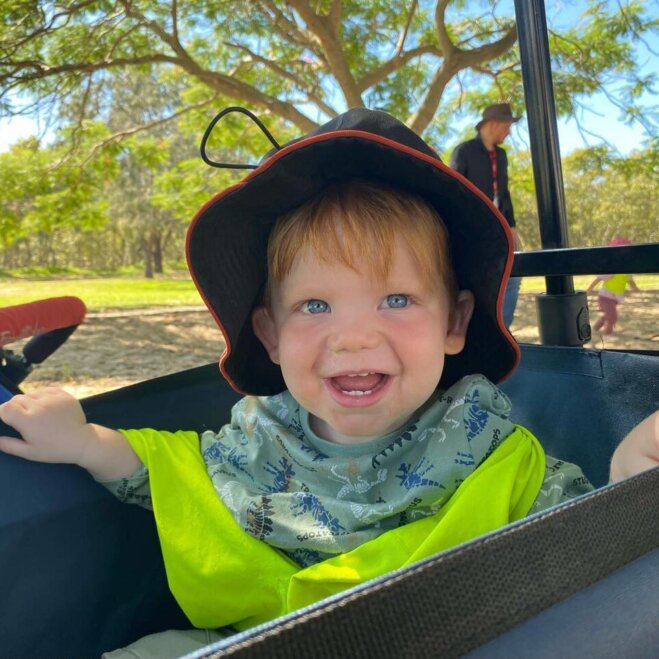
When you think of childcare, you might not necessarily think of early education, but that’s precisely what Little Scholars is doing; providing high calibre early education for the critical first five years of a child’s life, and at the same time, changing society’s perception of what childcare, or early education, is.
Little Scholars has always considered itself as a leader in the sector, but we elevated the quality of education with the addition of Susan Cooper, our group pedagogical leader one year ago.
Pedagogy is a form of teaching strategies in the practice of educating. It’s the techniques, strategies and approach taken by educators to let learning and development to take place. Pedagogy refers to the interactive process between the educator, the learner and the learning environment and provides reason to the design of learning spaces, materials, and resources on offer. Pedagogical leadership supports educators in relating their pedagogy to content knowledge and educational theories.
My aim is to support educators in entering the child’s world, enabling them to reflect on their practices and build capacity to support the child’s development.
– Susan Cooper, group pedagogical leader for Little Scholars
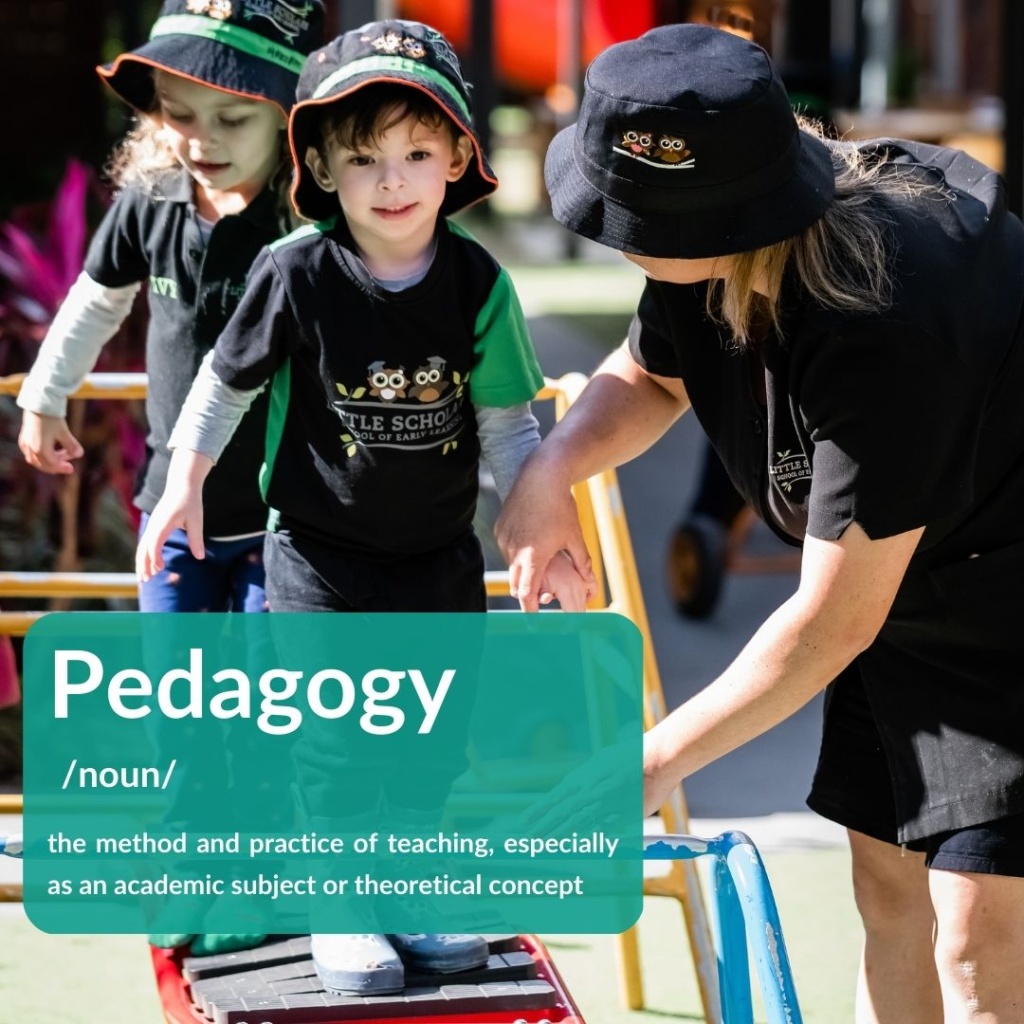
In the year since Susan joined us, she’s gone above and beyond to support our educators. Through her pedagogical leadership, Little Scholars has raised the benchmark of its overall quality of teaching, and recognises that providing children with strong foundations for ongoing learning and development is underpinned by a strong pedagogical practice. She inspires educators to employ new approaches to their teaching against up-to-date research, has helped translate the Little Scholars values and principles into practice and has without a doubt increased the quality of experiences and interactions across our campuses.
But the role was daunting at first, according to Susan.
“Having come with approximately 16 years’ experience in having been in varied roles across the sector within early childhood, my love of sharing knowledge and inspiring others drew me to apply to this role,” Susan says. “My experience in playwork allows me to see the true value in children’s play, the need to create spaces and support the learning and approach to working with children to support and facilitate play in its true essence. What really resonated with The Scholars Group and my own personal values and beliefs, was placing children as the core and central to all that we do.
“I see myself as an advocate for children’s rights, being the voice for many and striving to excel toward quality outcomes.”
The group pedagogical role is focused on mentoring and guiding teams in their practices and challenging new ways of working, to support innovative curriculum ideas, while supporting children’s learning across all Little Scholars campuses.
“I found the team to be so supportive and receptive to change, which has allowed me to share my vision, passion, and skillset,” Susan says.
With Susan’s support, our Deception Bay campus was rated exceeding against the National Quality Standards (NQS) in late 2022. A thrilling result, but not without a lot of preparation. Susan guided Nat, the campus manager, and her team, in the Assessment and Rating Process.
“It was critical that the team worked collaboratively toward a shared goal. This involved building strong relations with the team to build trust and mutual respect. This partnership saw me engage with all stakeholders, while we worked toward targeted goals and worked through evidence-based data to the exceeding themes,” Susan says.
Strong knowledge of theory and pedagogy underpinned the quality outcomes, according to Susan. Another great achievement Susan says, was the team being ranked 3rd out of 3,126 early learning centres across the state.
“My role is to take an active role in the development of pedagogy in the early childhood context. I primarily work alongside teams, across our 13 campuses to provide the opportunity to share pedagogical practice, leading knowledge to research and child development,” Susan says. “Not only does pedagogy inform direct work of teaching, but also the more indirect work of leadership. This develops a community of practice, where professional educators can share ideas and knowledge and engage in peer learning.”
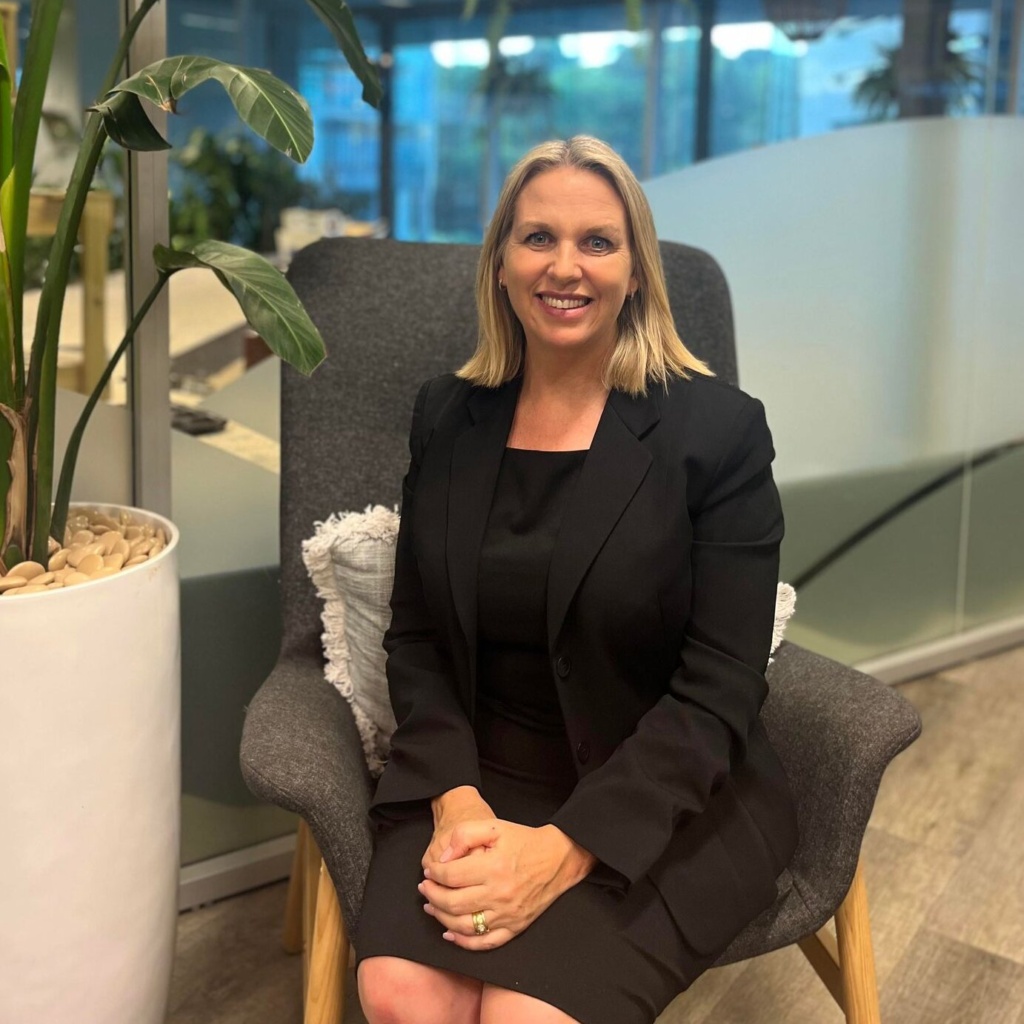
“Little Scholars has always been a leader in our field, due to our commitment and passion to the early years. With the addition of our Group Pedagogical Leader, the effectiveness of our educational program and practice has been elevated to a level we didn’t think was possible,” says Jae Fraser, founder of Little Scholars.
“In Susan’s role she is supporting and mentoring the team to influence children’s learning by fostering family engagement, ensuring fidelity to the Little Scholars curricular philosophy, using data to evaluate the effectiveness of our learning program, and exceeding standards established to optimise learning effective environments,” says Jae. “We couldn’t be happier with the results of this new role just after one year, and we are so excited to see the future.”
Susan’s goals for her role are simple: to continue to strive toward excellence, raising the benchmark in early childhood and placing children at the forefront of everything Little Scholars does.
“I take great pride in the relationships I’ve developed, the partnerships I have established, creating a safe space for the children and educators I work with,” Susan says reflecting on the past year. “Our impact is significant, and I’m thrilled to witness the progress in both the children and educators. I feel grateful to be part of such meaningful work, knowing that we’re making a real difference in the lives of these children.”
We have the very best early education educators at Little Scholars School of Early Learning. It’s our great honour to present our 2023 Little Scholars Employee Award winners. 🎖
These outstanding recipients, through some challenging times, have demonstrated their dedication, commitment and have gone above and beyond this year with fellow educators, children, and parents. Time and time again they show us, their peers and the families who they have the privilege of looking after their enthusiasm, their eagerness to learn and grow, and their unfaltering dedication to educating and developing small humans.
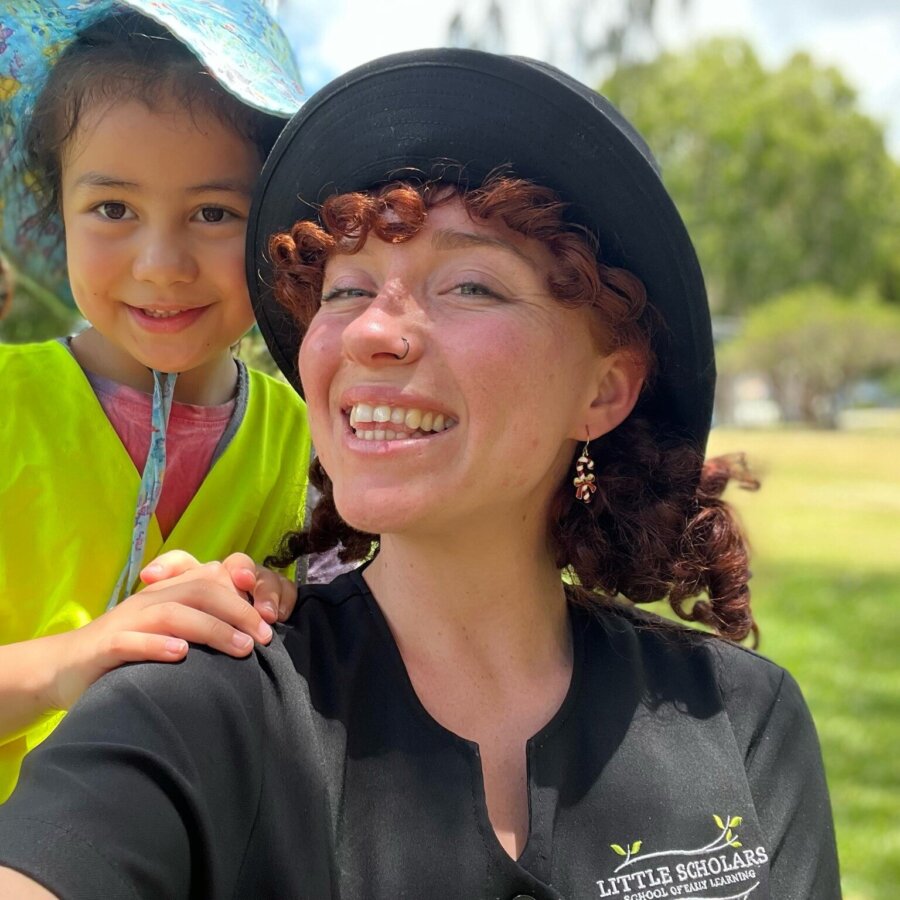
Inspire – Little Scholars Pillar Award 2023
Learn more about Ella
How long have you been an educator, Ella?
I have been an educator for four years now, and with Little Scholars since my placement when I began my certificate 3 at TAFE.
How did you start your career?
I had been looking at Little Scholars as a centre for my daughter since I was pregnant and fell in love with it from the get-go. Since beginning to have my daughter at the centre, I saw the love and care that the educators gave the children. Working with children had always been on my agenda as I used to study to be a music teacher and knew I could do so much more as an early childhood educator to assist the children in excelling in all areas before beginning “big school.”
What did being recognised for the inspire award mean to you?
The award completely blindsighted me as I turn up to work each day just to do my best for these little humans so to be recognised for my relationship with the children in my centre was so special to me and really instilled my role within the company and the importance I hold alongside my other educators in this industry.
Ella’s nomination
Ella is an educator with the Little Scholars Deception Bay campus, which recently was assessed Exceeding under the National Quality Framework for Early Childhood Education and Care.
In Ella’s nomination to us, it said, “Ella is an inspiration for all in the Deception Bay community. We had some outstanding feedback from the department through our assessment and rating process. Before the process even started, the assessor had mentioned the passion and authenticity observed in Ella’s interactions with our children, families and community. In the assessor’s words – ‘she could sit and watch Ella all day long.’ From one of Ella’s colleagues, ‘the educator she is, is who I aspire to be in my future teaching career. She is strong, but also so caring to each individual child.’
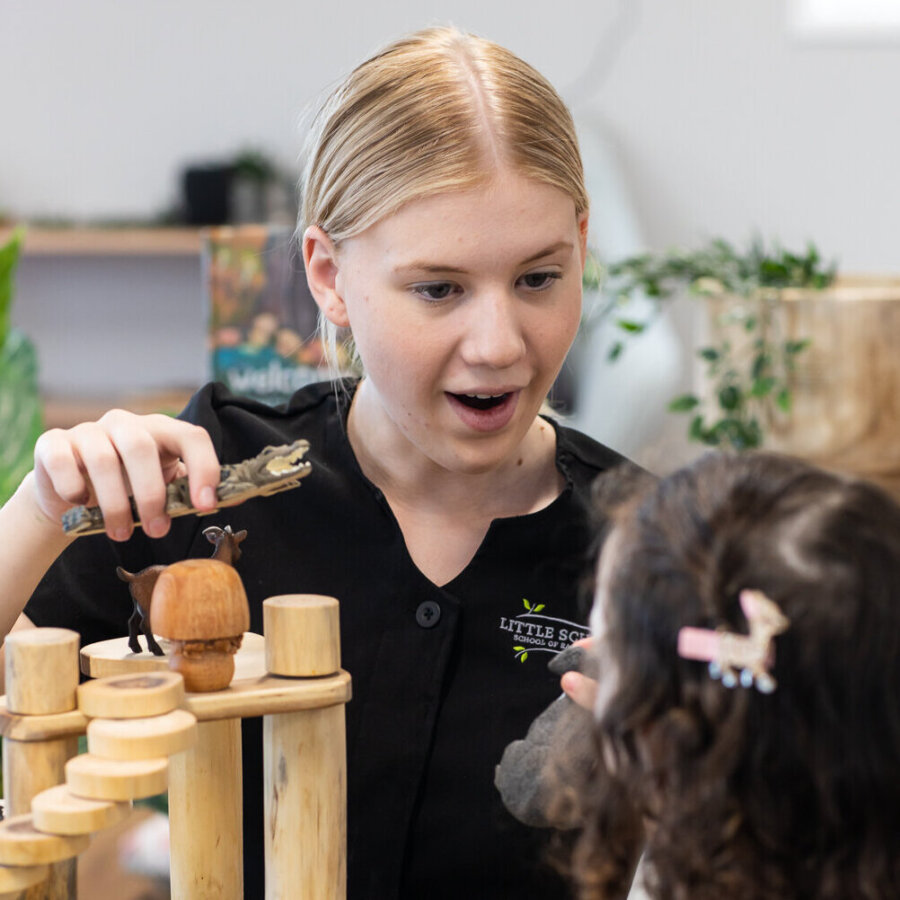
Learn – Little Scholars Pillar Award 2023
Learn more about Ellissa
Ellissa is a lead educator at our Ormeau Village campus. She was named winner of the Pillar Award in the Learn category because she stepped up to become a lead educator, and we’re told she is always happy to keep learning from her peers and further her education in the sector.
How long have you been an educator?
I’ve been an educator since I was 16, but even younger I was at my mum’s centre helping out wherever I could.
How long have you been with Little Scholars?
I’ve been with Little Scholars for about 18 months, since Ormeau Village opened.
What made you want to become an educator?
I think just having the inspiration of my mum being in that environment, seeing what she does, seeing how she helped shape the children, it made me want to do it as well. Just seeing how I could help children as well.
What did winning the award mean to you?
I’m always trying my absolute best to do the best possible work I can do, so it meant that someone else was seeing that, that it was appreciated. It’s made it feel worth it!
What do you like about working with Little Scholars?
Just the support and having the creative freedom to do things that I couldn’t do at other places. Like taking them on Bush Kinder adventures and all these other fun things they get to do that they may not have the opportunity to do anywhere else. And everyone at head office as well, like Susan, Mel and Jae-them being so active in our centre, that’s something I really appreciate as well.
On the quick move from an assistant educator to lead educator, Ellissa says:
The support I had helped me to grow so fast, because if I was somewhere else and didn’t have the support, I probably wouldn’t have become lead, but the support from everyone about what I could do, what I would have to do, really helped when I stepped up.
Ellissa is finishing up her studies with her Cert III, then she’ll be moving onto her Graduate Diploma.
From the award submission: Ellissa has stepped up into her Lead role during last year and we have watched her grow from assistant to well-deserved Lead and take charge in her space, leading her colleagues while taking feedback on board and striving to excel.
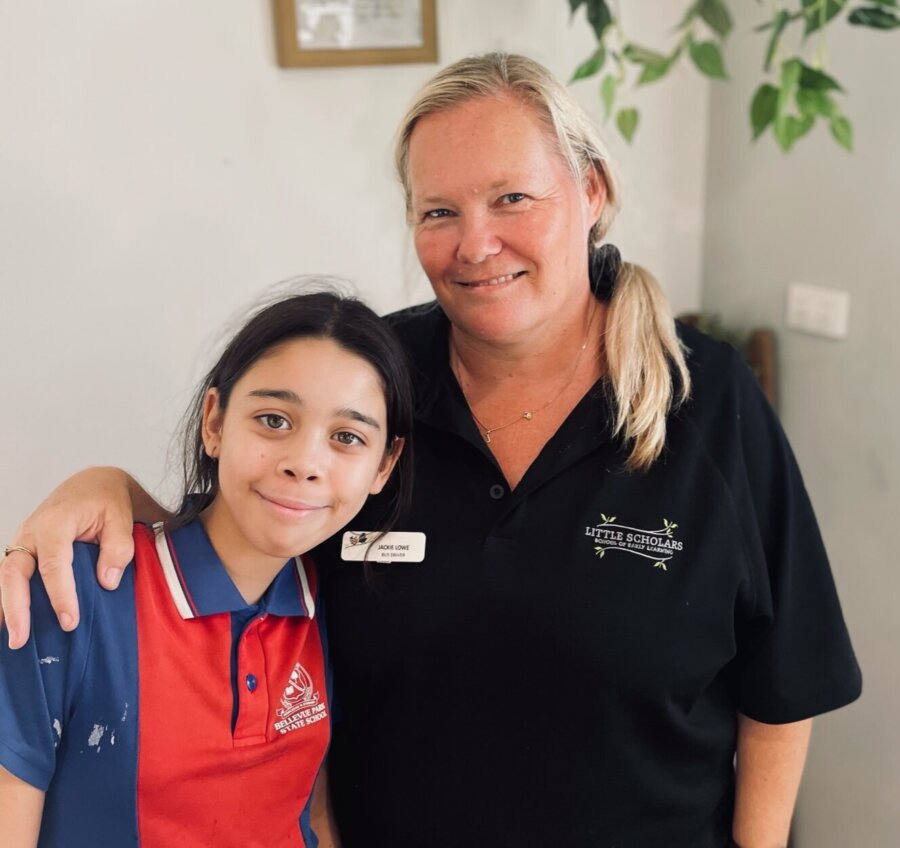
Contribute – Little Scholars Pillar Award 2023
Learn more about Jackie
How long have you been in educator?
I’ve been an educator on and off for about 20 years. I’ve been with Little Scholars for a year now.
Hey that’s pretty good to get recognised in your first year!
I know it was so good!
What’s made you want to become an educator?
Just from being young and starting off babysitting, which I loved, and then Year 12 back then we had work experience and that was just going to a centre and from that first day I knew what I wanted to do. I just fell in love with it, and from then it was my goal to finish school and become an early childhood teacher
What is it now, 20 years on, that you still love about working in this sector?
It’s just the love of being around children, i’m just being with a team of educators, and I missed that like when I went away from it and did my business, I just missed it so much. It’s just working children just gives me so much joy.
All my children are older, are grown up, and it was just not a grandmother yet or anything it was just that feeling, it just going back into a centre and it just makes me so happy.
You won the Pillar Award for ‘contribute’ and you’re known as a ‘jack of all trades’, what do you do?
No job is too big or too small! I do the bus, I’m the after-school care educator, I can work in the kitchen, I can listen to other team members, there’s nothing that I won’t try! That’s just who I am, when I’m needed, I’ll do anything to help the team out.
Especially your first year at Little Scholars, what did winning an award mean to you?
My goodness, it was just so good, firstly I was surprised, but it was then good to know that the little things that I’m doing are noticed, I felt like, ‘Wow I am noticed!’ It just made me feel so happy knowing that all the jobs that I am doing people have recognised it, so yeah so then makes you feel like you are doing a great job!
I love working for Little Scholars. It’s an amazing company, I’ve worked with the other centres before, Little Scholars is just amazing and I’m happy to be there and helping out.
In Jackie’s nomination, campus manager Elise said, ‘Jackie is our jack of all trades! Jackie fits many hats at our campus. From driving the bus to being in the studios to going on vacation care, she wears her many hats with a smile on her face. Her bubbly nature and willingness to help the team wherever needed is admirable. We appreciate her dedication and consistent contribution to the campus.
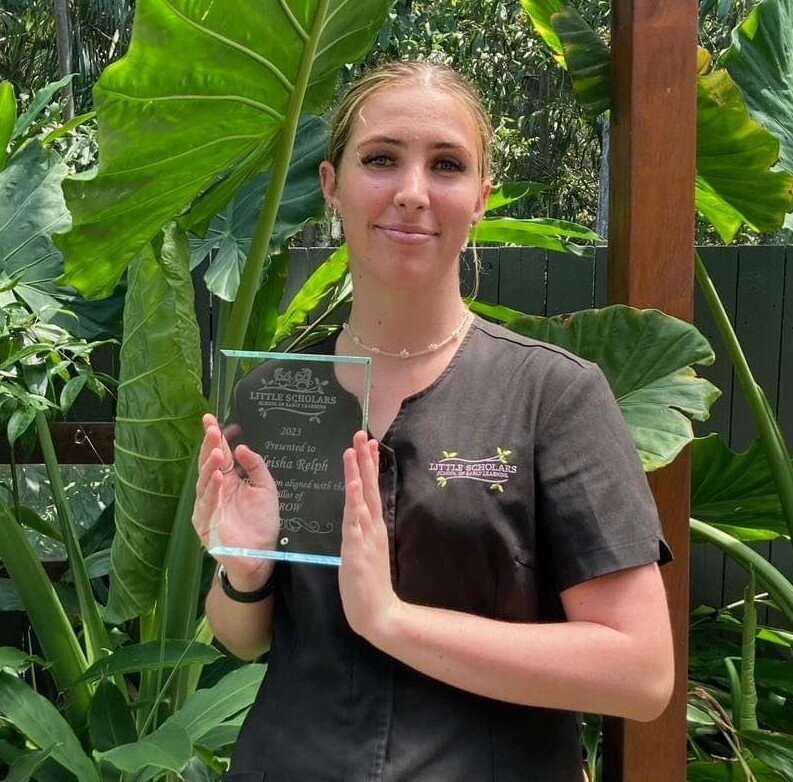
Grow – Little Scholars Pillar Award 2023
Learn more about Aleisha
Ellissa is a lead educator at our Ormeau Village campus. She was named winner of the Pillar Award in the Learn category because she stepped up to become a lead educator, and we’re told she is always happy to keep learning from her peers and further her education in the sector.
How long have you been an educator?
I’ve been an educator since I was 16, but even younger I was at my mum’s centre helping out wherever I could.
How long have you been with Little Scholars?
I’ve been with Little Scholars for about 18 months, since Ormeau Village opened.
What made you want to become an educator?
I think just having the inspiration of my mum being in that environment, seeing what she does, seeing how she helped shape the children, it made me want to do it as well. Just seeing how I could help children as well.
What did winning the award mean to you?
I’m always trying my absolute best to do the best possible work I can do, so it meant that someone else was seeing that, that it was appreciated. It’s made it feel worth it!
What do you like about working with Little Scholars?
Just the support and having the creative freedom to do things that I couldn’t do at other places. Like taking them on Bush Kinder adventures and all these other fun things they get to do that they may not have the opportunity to do anywhere else. And everyone at head office as well, like Susan, Mel and Jae-them being so active in our centre, that’s something I really appreciate as well.
On the quick move from an assistant educator to lead educator, Ellissa says:
The support I had helped me to grow so fast, because if I was somewhere else and didn’t have the support, I probably wouldn’t have become lead, but the support from everyone about what I could do, what I would have to do, really helped when I stepped up.
Ellissa is finishing up her studies with her Cert III, then she’ll be moving onto her Graduate Diploma.
From the award submission: Ellissa has stepped up into her Lead role during last year and we have watched her grow from assistant to well-deserved Lead and take charge in her space, leading her colleagues while taking feedback on board and striving to excel.
We are excited to welcome Susan Cooper, our new group Pedagogical Leader for Little Scholars School of Early Learning.
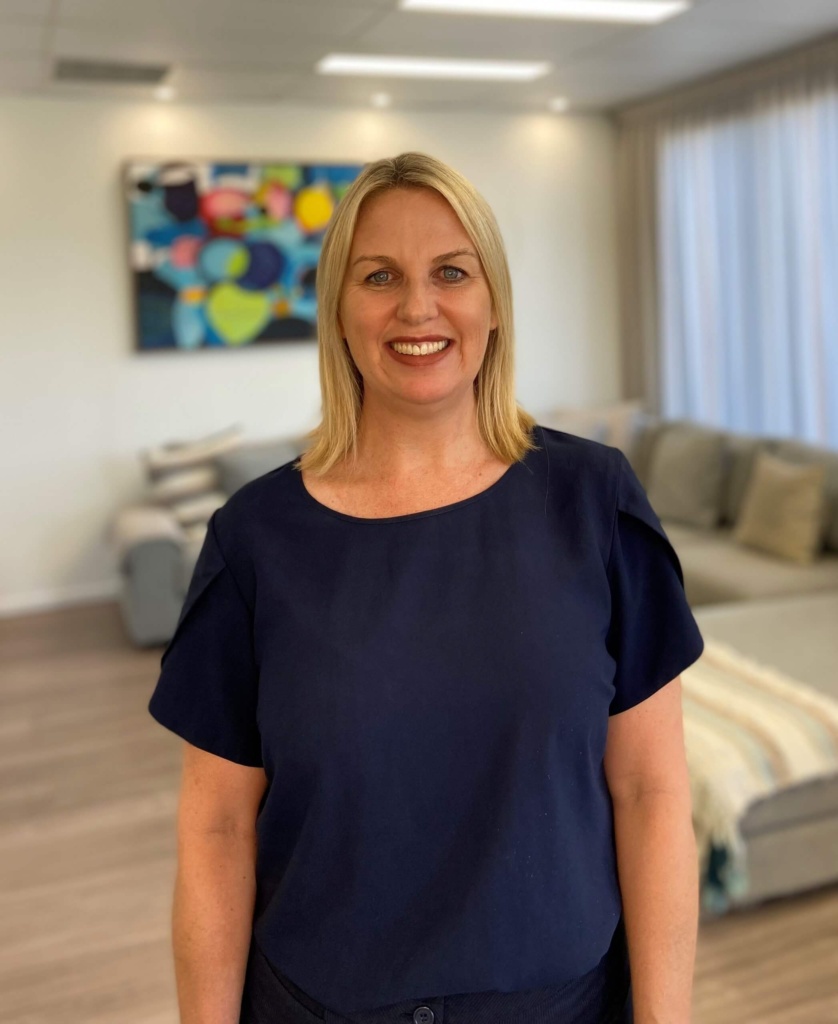
Susan will support educators to guide and influence children’s love of learning by fostering family engagement, ensuring fidelity to Little Scholars curricular philosophy, using data to evaluate the effectiveness of the learning program, and ensure we are exceeding standards to optimise learning environments and prepare children for successful futures.
Through pedagogical leadership, Susan hopes to raise the benchmark to overall quality of teaching and recognises that providing children with strong foundations for ongoing learning and development is underpinned by a strong pedagogical practice.
Pedagogy is a form of teaching strategies in the practice of educating. It is the techniques, strategies and approach taken by educators to let learning and development to take place. Pedagogy refers to the interactive process between the teacher, the learner and the learning environment and provides reason to the design of learning spaces, materials, and resources on offer. Pedagogical Leadership supports educators in relating their pedagogy to content knowledge and educational theories.
Susan’s primary role will be to provide leadership to pedagogy and support educators in relating their pedagogy to content knowledge and educational theories. Susan will be working across the 13 Little Scholars Early Learning Campuses mentoring and coaching our educational leaders to implement curriculum delivery. Susan will inspire educators to employ new approaches to their teaching against up-to-date research, which will shape the quality of experiences and interactions across our campuses.

Susan has worked in the Early Childhood Sector for more than 16 years and has extensive knowledge in the field of Pedagogical Practices. Having worked in many fields within the Education sector, from operating a family day care, to being an educator within long day care sector as well as outside school hour care services, through to management and leadership.
“To take on this role is exciting as I can share my passion, influencing pedagogy approaches and practices and place emphasis on children’s play to promote continuous child development and quality outcomes for children,” she says.
Susan is passionate about advocating for children’s rights and is a firm believer of a child-centred approach and that the quality of interactions between adults and children play a fundamental role in stimulating early learning.
According to Jae Fraser, founder of Little Scholars School of Early Learning, pedagogical leadership is about leading or guiding pedagogical practice, supporting Little Scholars educators in their work with children and families, and translating the Little Scholars values and principles into practice.
Why do our children sometimes express some big bursts of negative moods after they come home from a seemingly fun day at childcare? This could be due to after school restraint collapse. Meanwhile, you expect them to come home happy and excited to tell you all about their day of crafts, books, playtime and outings, after all, you often get reports that your child was an angel all day. But when he or she comes home, that angel seems to have taken those wings and flown away, being replaced with something not so angelic.
Some child experts call it ‘after school restraint collapse’, and it seems to happen because children hold it together all day in childcare. Children use a lot of energy being well-behaved, following direction, sitting still, retaining information, and all of this without their primary attachment figures, their parents/caregivers. It can also simply be that some children meltdown because they are tired or overstimulated. Wanting to learn more about Little Scholars and how we deal with these big emotions? Contact us today.
This leaves your child’s best opportunity to release their emotions when they get to a safe place, their home. Those emotions can take the shape of crying fits, whining, screaming, disrespect or physically acting out to parents or siblings.
“I always say to parents, ‘do you have a best friend, someone you let all your emotions out when you see them? You are this to your child and when they see you after a big, busy day at Kindy, it all comes out,’” says Libby Kissell, a lead educator with our Redland Bay South campus.
“Rest assured they had an amazing day, but they let it all out when they see you because YOU are their person, their safe zone.”
Young children haven’t yet developed the essential brain wiring or had the necessary life experience to be able to calm themselves down from big feeling states, which is why they experience such frequent meltdowns. They know they can do this at home because they’re in a place where they’re loved and supported.
Your child is loved and supported by our team at Little Scholars, talk to us if you’re struggling and we can think and discuss how to make things easier for your little one.
“As an adult, we come home from a big day at work and we just want time to ourselves to zone out and not have to think,” says Holly Medbury, an educator from our Stapylton campus.
“We might even get annoyed if people want our attention, kids feel the same, but often have difficulty expressing it. Children are little people with big emotions, they too need some time to ‘chill out’ or a friend to be there and hug, with no expectations. It’s just reassurance for parents out there that they are doing an amazing job and providing useful strategies to help children cope with their big emotions.”
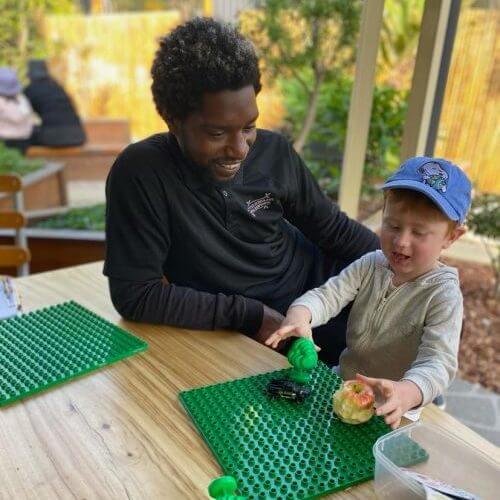
You can send them to their centre with a comfort toy or blanket that they can reach for when they need it. You could also send them with a picture of their family, or a note in their bag telling them how proud you are of them and how much you love them
Spend an extra five to 10 minutes with them before they start their day at Little Scholars. Just a few connected minutes with your child can make a significant difference in their day
Have a conversation with them on the way to childcare or when you get to their centre that focuses on what they can look forward to after you pick them up later, maybe that conversation looks like, ‘When I come to get you, would you like to go to the park or go pick out some new books to read at the library?’
Bring a snack for the trip home, sometimes hunger can be distracting for them and can stir up emotions.
When you pick them up, maybe all they need is a big reassuring hug. Maybe they need quiet. Maybe they’d like to tune out to some music they enjoy for a few minutes. Maybe they need to relax on a park bench or burn some energy at the playground. Follow their lead and take some time before asking questions about their day.
Again, feel free to talk to your educators about what’s happening at home. We have an open-door policy and we’re here for you. Your child’s educators, after spending time with your little one, may have specific ideas on how to help your child or can try to dedicate some quality time with your child to help them relax and feel cared for.
By understanding a little better why there are strong feelings coming from your child after a day of childcare, you are better armed to handle after school restraint collapse or even moderate reactions before their start.
For more information:
At Little Scholars School of Early Learning, we’re dedicated to shaping bright futures and instilling a lifelong passion for learning. With our strategically located childcare centres in Brisbane and the Gold Coast, we provide tailored educational experiences designed to foster your child’s holistic development.
Let us hold your hand and help looking for a child care centre. Leave your details with us and we’ll be in contact to arrange a time for a ‘Campus Tour’ and we will answer any questions you might have!
"*" indicates required fields
Let us hold your hand and help looking for a child care centre. Leave your details with us and we’ll be in contact to arrange a time for a ‘Campus Tour’ and we will answer any questions you might have!
"*" indicates required fields